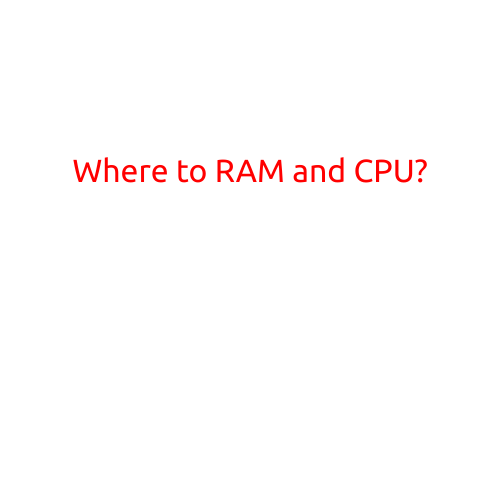
Where to RAM and CPU? A Comprehensive Guide to Choosing the Best Pieces for Your Computer
When building or upgrading a computer, one of the most crucial decisions you’ll face is choosing the right RAM and CPU. These components play a vital role in determining your computer’s performance, and selecting the right ones can make a significant difference in your overall computing experience.
In this article, we’ll delve into the world of RAM and CPU, discussing what you need to know to make an informed decision. We’ll cover the basics, explaining the differences between the two, and then provide tips and recommendations to help you find the perfect pieces for your needs.
What is RAM and CPU?
Before we dive into the details, let’s quickly define what RAM and CPU are:
- RAM (Random Access Memory): RAM is a type of computer memory that temporarily stores data and applications while your computer is running. The more RAM you have, the more applications you can run simultaneously without slowing down your computer.
- CPU (Central Processing Unit): The CPU is the brain of your computer, responsible for executing most instructions that your computer receives. It’s responsible for processing information, performing calculations, and controlling the other components of your computer.
Understanding RAM
When it comes to RAM, there are a few key factors to consider:
- Capacity: The amount of RAM you need depends on how you use your computer. For general use, 8GB of RAM is a good starting point. For gaming, video editing, or other resource-intensive activities, 16GB or more is recommended.
- Type: There are two main types of RAM: DDR3, DDR4, and DDR5. DDR5 is the latest standard and offers faster speeds and lower power consumption.
- Speed: RAM speed is measured in MHz (megahertz). Faster speeds, such as 3200MHz or higher, provide better performance.
Understanding CPU
When it comes to CPU, there are a few key factors to consider:
- Cores: The number of CPU cores determines how many tasks your computer can handle simultaneously. For general use, 4-6 cores are sufficient. For heavy-duty tasks, 8-12 cores are recommended.
- Threads: CPU threads measure the number of simultaneous tasks your computer can handle. For gaming and other applications, 4-8 threads are sufficient.
- Clock Speed: CPU clock speed is measured in GHz (gigahertz). Faster clock speeds, such as 3.5GHz or higher, provide better performance.
Where to Find the Best RAM and CPU
So, where do you find the best RAM and CPU for your needs? Here are some tips:
- Research: Read reviews and compare different models to find the best fit for your needs.
- Brand: Look for reputable brands such as Intel, AMD, Kingston, and Corsair.
- Price: Balance price with performance. Generally, more expensive RAM and CPU models offer better performance, but it’s not always necessary to splurge.
- Compatibility: Ensure the RAM and CPU you choose are compatible with your computer’s motherboard and other components.
Conclusion
Choosing the right RAM and CPU can be overwhelming, but by understanding the basic principles and following the tips outlined above, you’ll be well on your way to making an informed decision. Remember to consider your specific needs, research different models, and balance price with performance. With the right RAM and CPU, you’ll be able to enjoy a smooth, efficient computing experience.





